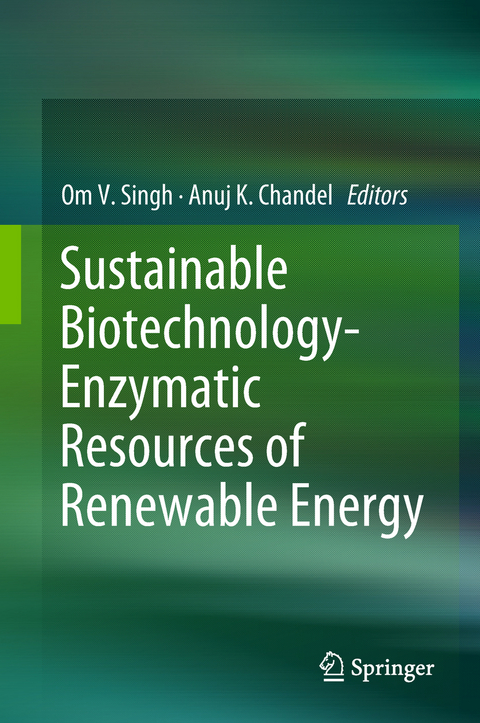
Sustainable Biotechnology- Enzymatic Resources of Renewable Energy
Springer International Publishing (Verlag)
978-3-319-95479-0 (ISBN)
Nature offers abundant renewable resources that can be used to partially replace fossil fuels and commodity chemicals but issues of cost, technology readiness levels, and compatibility with existing distribution networks remain huge challenges. Cellulosic ethanol and biodiesel are the most immediately obvious target fuels, with hydrogen, methane and butanol as other potentially viable products. This book continues to bridge the technology gap and focus on critical aspects of lignocellulosic biomolecules and the respective mechanisms regulating their bioconversion to liquid fuels into energy and value-added products of industrial significance. This book is a collection of reviews elucidating several broad-ranging areas of progress and challenges in the utilization of sustainable resources of renewable energy, especially in biofuels. This book comes just at a time when government and industries are accelerating their efforts in the exploration of alternative energy resources, with expectations of the establishment of long-term sustainable alternatives to petroleum-based liquid fuels. Apart from liquid fuel this book also emphasizes the use of sustainable resources for value-added products, which may help in revitalizing the biotechnology industry at a broader scale. This book also provides a comprehensive review of basic literature and advance research methodologies to graduate students studying environmental microbiology, chemical engineering, bio-economy and microbial biotechnology.
Om V. Singh is a Senior Scientific Consultant at the Technology Science Group (TSG) in Washington, DC, USA. Prior to joining the TSG, he served at the US Food and Drug Administration's (FDA) Center for Devices and Radiological Health (CDRH), where he advised companies on anticipated regulatory pathways when seeking approval and registration for their human health products. Om holds a BSc and MSc in biological sciences, and a PhD in microbial biotechnology with an emphasis on exploring microbial wealth for value added products of commercial significance. While completing his postdoctoral studies at the Johns Hopkins School of Medicine, he also obtained a second Master's degree (MS) in regulatory affairs in life sciences from Johns Hopkins University. He has been an Associate Professor of Microbiology at the University of Pittsburgh, Bradford. Om's research has centered on exploring the wealth of extremophiles in the medicine and bioenergy sector. He has published numerous peer-reviewed research articles and book chapters, and has edited a number of books and special issues of peer-reviewed research journals.
1. Introduction.- 2. Role of Systematic Biology in Biorefining of Lignocellulosic Residues for Biofuels and Chemicals Production.- 3. Biotechnological advancements in cellulosic ethanol production.- 4. Sustainable production of biofuels from weedy biomass and other unconventional lignocellulose wastes.- 5. Technological Aspects of lignocellulose conversion into biofuels: Key challenges and practical solutions.- 6. Beyond ethanol: Contribution of various bioproducts to enhance the viability of biorefineries.- 7. Real Techno-economic assessment of bioethanol production from major lignocellulosic residues under different process configurations.- 8. Lignocellulolytic Enzymes from Thermophiles.- 9. Application of enzymes in Sustainable liquid transportation fuels production.- 10. The Realm of Lipases in Biodiesel Production.- 11. Nanotechnology- based developments in biofuel production: Current trends and applications.- 12. Ester-based biofuels from wastes.- 13. Sustainable production of biogas from renewable sources: global overview, scale up opportunities and potential market trends.- 14. Microbially Originated Polyhydroxyalkanoate (PHA) Biopolymers: An Insight into the Molecular Mechanism and Biogenesis of PHA Granules.- 15. Biopolymer Synthesis and Biodegradation.- 16. The application of microbial consortia in a biorefinery context: understanding the importance of artificial lichens.- 17. Green microalgae as substrate for producing biofuels and chlorophyll in biorefineries.- 18. Future perspectives and potential applications of enzymes in sericulture.- index.
| Erscheinungsdatum | 23.09.2018 |
|---|---|
| Zusatzinfo | XII, 476 p. 65 illus., 45 illus. in color. |
| Verlagsort | Cham |
| Sprache | englisch |
| Maße | 155 x 235 mm |
| Gewicht | 935 g |
| Themenwelt | Naturwissenschaften ► Biologie ► Mikrobiologie / Immunologie |
| Technik ► Elektrotechnik / Energietechnik | |
| Technik ► Umwelttechnik / Biotechnologie | |
| Schlagworte | Bacteria • bioenergy • biofuel • Bio-products • Enzymatic bioconversion • Lignocellulosics |
| ISBN-10 | 3-319-95479-2 / 3319954792 |
| ISBN-13 | 978-3-319-95479-0 / 9783319954790 |
| Zustand | Neuware |
| Haben Sie eine Frage zum Produkt? |
aus dem Bereich


